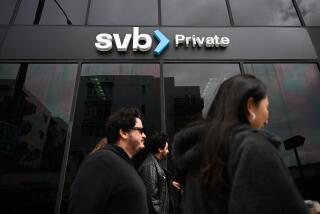IndyMac denies it is near failure
Battling rumors that it may collapse, Pasadena-based IndyMac Bancorp acknowledged Monday that its financial position had deteriorated but described the fears as overblown and said it was working with regulators to improve its “safety and soundness.”
IndyMac, a national home lender burned by the mortgage meltdown, went public after depositors lined up at San Gabriel Valley branches starting Friday to pull out their money. Striving to reassure them, the thrift said nearly all their deposits were insured by the Federal Deposit Insurance Corp.
Nonetheless, Elizabeth Brown closed four accounts totaling $200,000 Monday at an Arcadia branch where about 20 customers were lined up at noon, saying: “The only reason I’m panicking is if anything happens, my money is tied up.
“I don’t want to take the chance,” said Brown, 62, of Temple City. “I’m going to put my money somewhere else, and if they come back, I’ll come back.”
Rick McPherson, 64, said he grew worried after hearing news reports that IndyMac was struggling, and withdrew $1,000 he had at IndyMac.
“I’m not certain what happens when a bank fails,” said McPherson, a printer from Arcadia. “I don’t trust the economy right now.”
The concerns were triggered by Sen. Charles E. Schumer (D-N.Y.), chairman of the Joint Economic Committee, who said in public letters to the FDIC and other bank regulators Thursday that IndyMac “could face a failure if prescriptive measures are not taken quickly.” IndyMac said Monday that Schumer had created the “wrong impression” about the savings and loan’s risks.
FDIC Chairman Sheila Bair has said examiners are forcing lenders to aggressively write down the value of their mortgages and home-builder loans to reflect likely losses from the worst downturn in housing markets since the Depression. To offset those write-downs, the banks and thrifts must get capital infusions from new investors or find buyers -- alternatives that IndyMac spokesman Grove Nichols said were being explored. He declined to provide details.
“Of course we do need to raise capital,” Nichols said. “We’re working the problem from many angles. That’s all I can say.”
The company’s stock sank 19 cents Monday to close at 62 cents a share. The shares are down 90% this year.
IndyMac, which had specialized in making -- then often selling -- jumbo mortgages, sub-prime loans and mortgages with little or no income verification, was hit hard last year when defaults caused the market for such nontraditional loans to collapse. It has since recast itself as a maker of loans that can be sold to government-sponsored loan buyers Fannie Mae and Freddie Mac, but its May loan production, at $2 billion, was down 72% from a year earlier.
In its March 31 report to regulators, IndyMac said 8.86% of its loans were delinquent, up from 1.51% a year earlier. It lost $168 million in the first quarter, compared with a profit of $59 million a year earlier.
IndyMac, which operates 31 offices and also takes deposits over the Internet, said the outflow of money increased on Saturday after continuing news coverage of Schumer’s remarks. The outflow Friday and Saturday totaled about $100 million, or about 0.5% of its total deposits of $19 billion, the company said.
More than 96% of IndyMac’s deposits are safe because they are insured by the FDIC, IndyMac said. The agency covers up to $100,000 per depositor. Retirement accounts are insured separately for up to $250,000.
IndyMac said it would help depositors with accounts over those limits restructure them into separate FDIC-insured accounts of less than $100,000. If a customer has too much money to do that, the thrift said, it would advise that some money be moved to another institution.
Dan Thorpe, a real estate investor from Ontario, rushed to the Arcadia office Monday after reading Schumer’s comments. He said he had been thinking about shutting his money market account, but an IndyMac representative persuaded him to keep his money in the bank.
“It’s insured so I’m not worried,” Thorpe, 59, said. “I figure it’s safe.”
IndyMac’s troubles also weren’t enough to dissuade Vosgan Mousheghian, an optician from Glendale, from depositing money into his account at the Glendale branch on Monday morning.
“The thing is, every bank is going down. Everybody’s afraid,” Mousheghian, 42, said. “You can never tell who’s going to go bankrupt first.”
The number of concerned depositors in branches Monday was “somewhat elevated,” but “substantially lower than on Saturday,” IndyMac said.
It added that “we are hopeful that this issue appropriately abates soon, so that we can focus, with our regulators involvement, on the important issue of continuing to keep IndyMac Bank safe and sound through this unprecedented crisis period.”
--
--
--
Times staff writer Tom Petruno contributed to this report.
More to Read
Inside the business of entertainment
The Wide Shot brings you news, analysis and insights on everything from streaming wars to production — and what it all means for the future.
You may occasionally receive promotional content from the Los Angeles Times.











